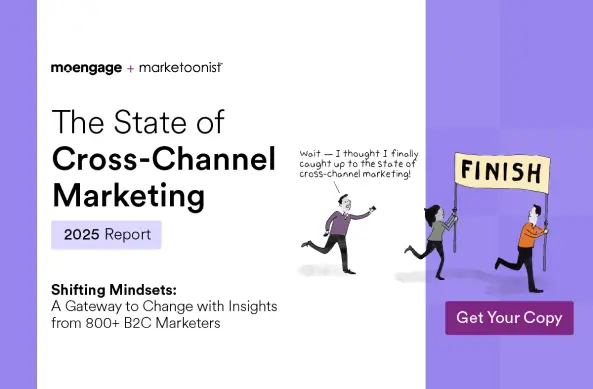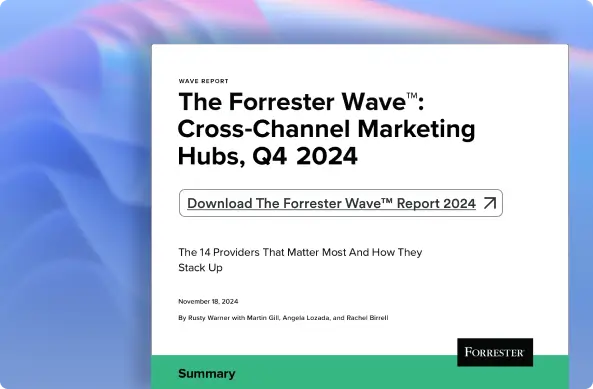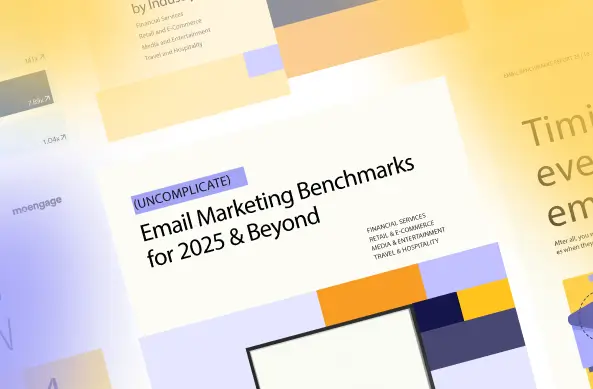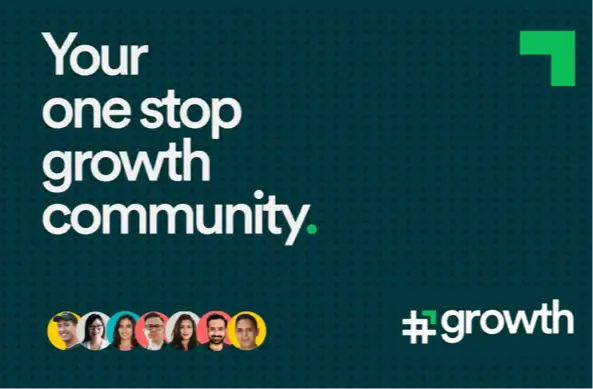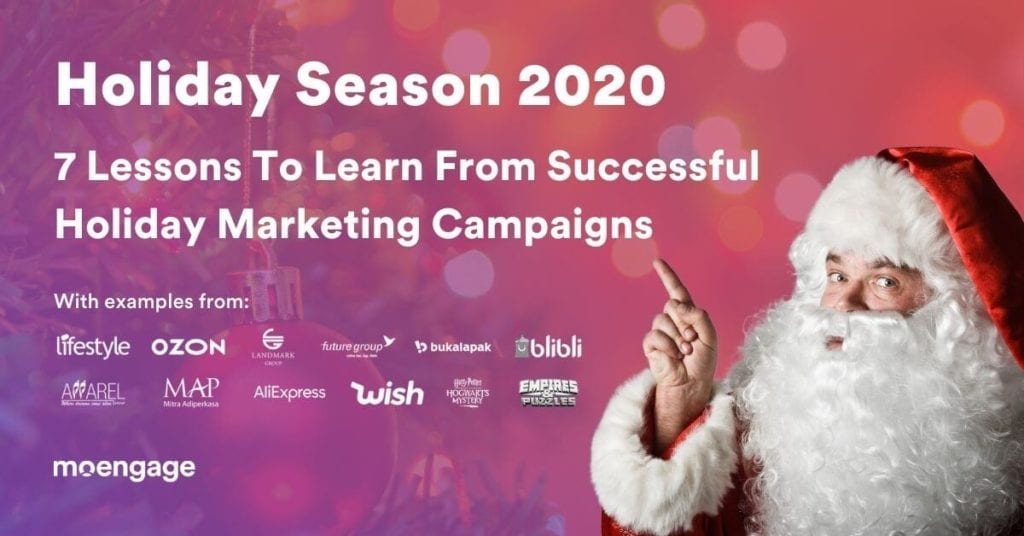4th of July Sale: Impact On In-App Purchases And Revenue Of Mobile Game Publishers
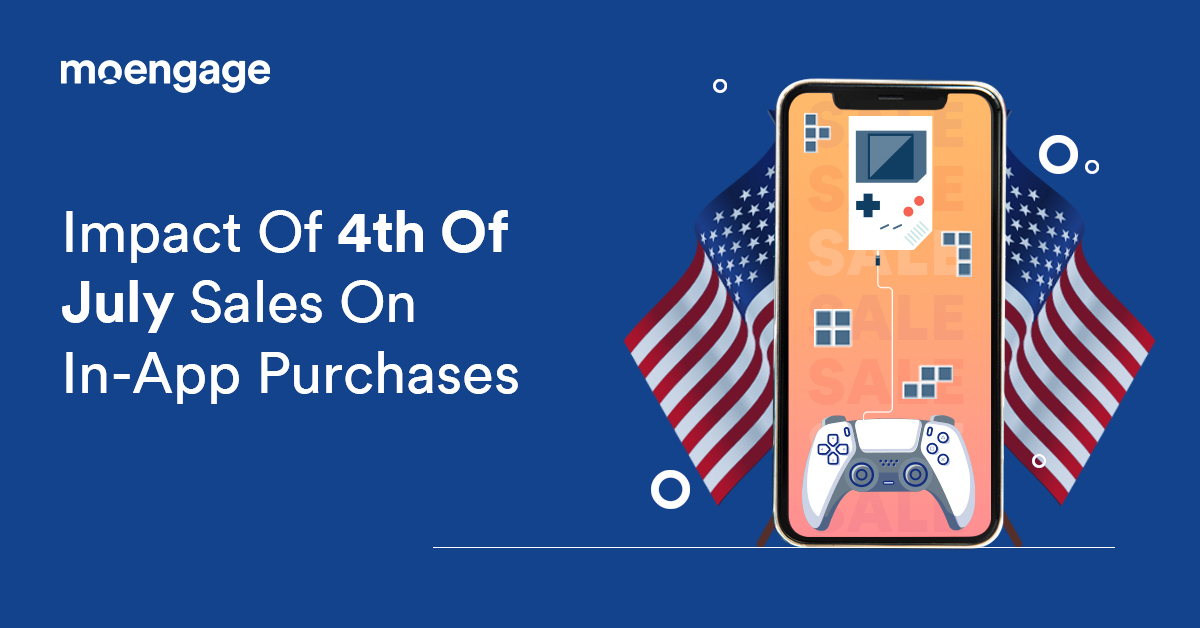
Reading Time: 7 minutes
The 4th of July is recognized as a federal holiday in the United States of America to commemorate the Declaration of Independence. However, it is also an important date on the calendar for mobile gamers across the globe.
This is one of the two times in a year (the other being Black Friday/Cyber Monday) where top mobile publishers launch lucrative deals, offers, and sales. As with other verticals like shopping, the mobile gaming industry sees a huge uptick in the number of in-app purchases during these two sales periods.
In this article, you’ll see the impact that 4th of July sales had on mobile gaming revenue this year. You’ll also find tips and strategies to prepare yourself for the upcoming Black Friday/Cyber Monday sale season later this year in November.
The direct impact of 4th of July sales on in-app purchases
In 2021, the mobile gaming industry witnessed an increase of 7.2% in gross revenue. Over $7.6 billion was generated from player spending alone. The top contributor of the global revenue in July was the United States, generating over $2.2 billion.
Here are a few mobile games that saw a surge in in-app purchases:
1. Pokémon GO by Niantic
Pokémon GO earned close to $2M through in-app purchases on the 4th and 5th of July 2021. The week that followed saw in-app purchases of more than $1.8M daily.

2. Genshin Impact by Mihiyo
Genshin Impact saw in-app purchases reach up to $1.75M daily in the first few days of the week following the 4th of July weekend this year.
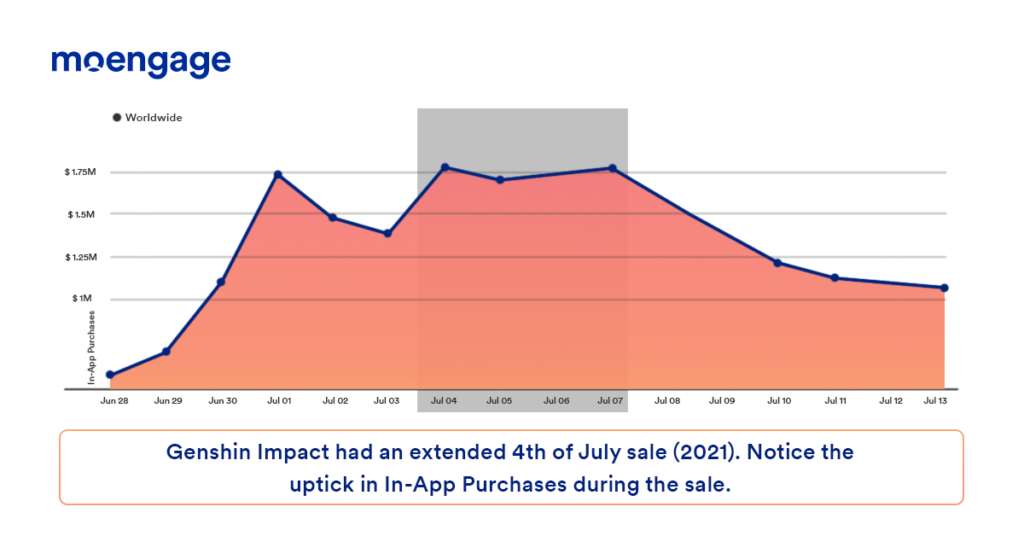
3. Clash of Clans by Supercell
Clash of Clans witnessed an uptick in the number of in-app purchases in the week following the 4th of July 2021. Supercell earned about $1.3M on average during this period daily.
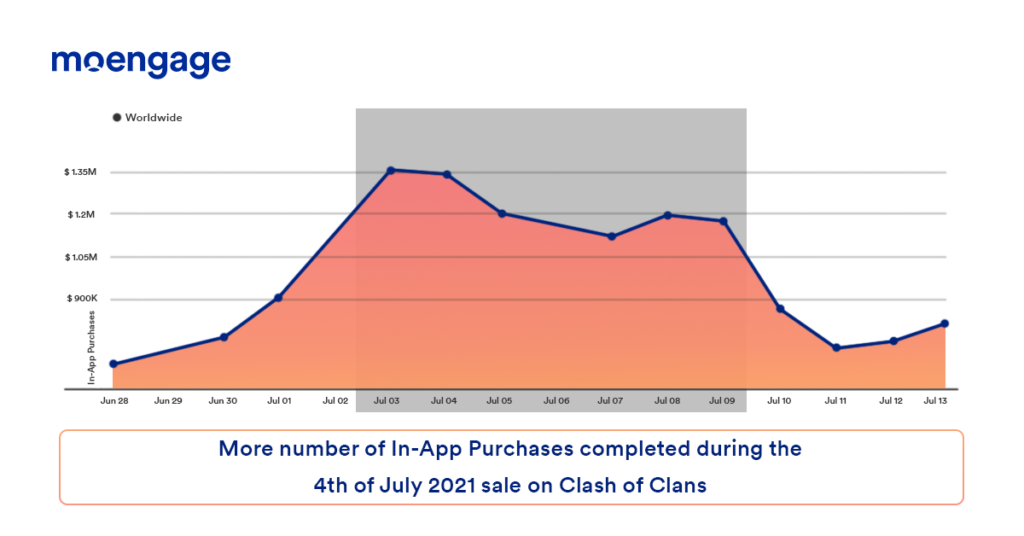
4. Marvel’s Contest of Champions by Kabaam
Marvel’s Contest of Champions earned close to $1M during the 4th of July sale. The upward trend in the in-app revenue continued for a few more days in the same week.
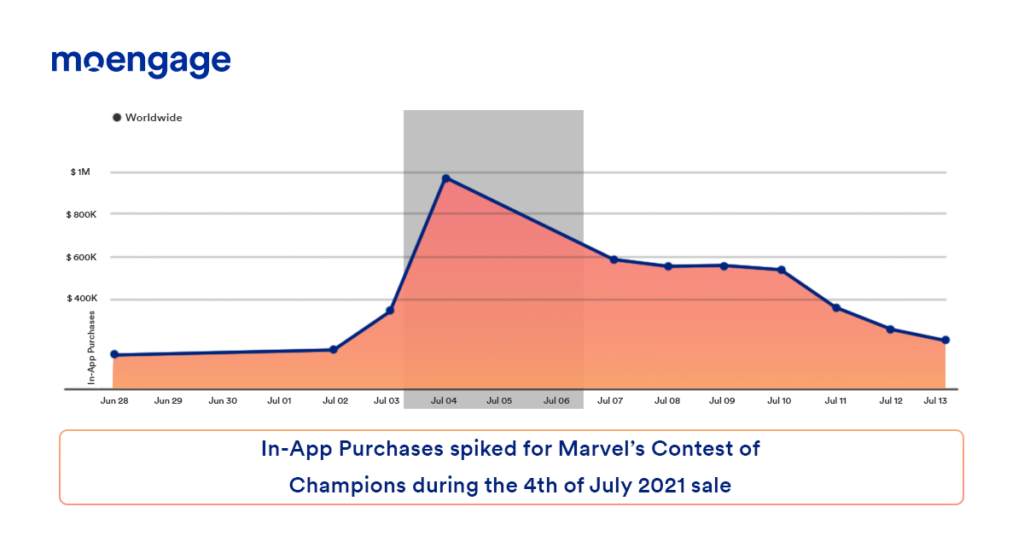
5. Call of Duty: Mobile by Activision
In-app purchases on Activision’s Call of Duty: Mobile crossed $780K on the 4th of July weekend and continued to remain close to $720K till the 9th of July.
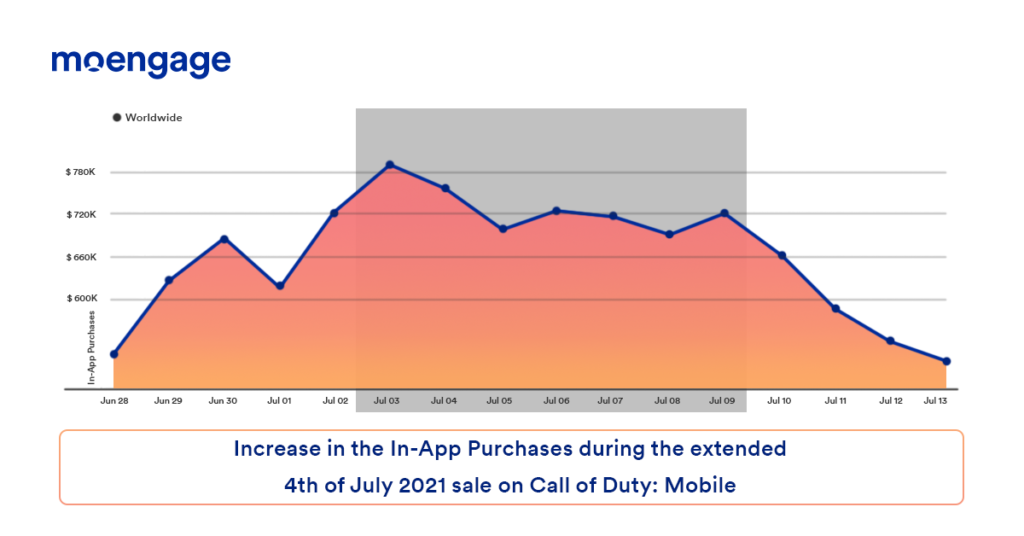
How can you drive maximum purchases during sale seasons like the 4th of July?
While capitalizing on player expectations of sale seasons is a great idea, driving revenue can still be a challenge. If you’ve been doing this for some time, you must already have a good sense of how you can achieve this. However, if there’s still a chance you haven’t tried the below strategies, now’s the best time to include it for the upcoming Black Friday/Cyber Monday season.
1. Use in-app messages and game forums to announce upcoming sale seasons
Mihiyo uses in-app messages to inform players of Genshin Impact about upcoming events and sales offers. Here’s how it looks:
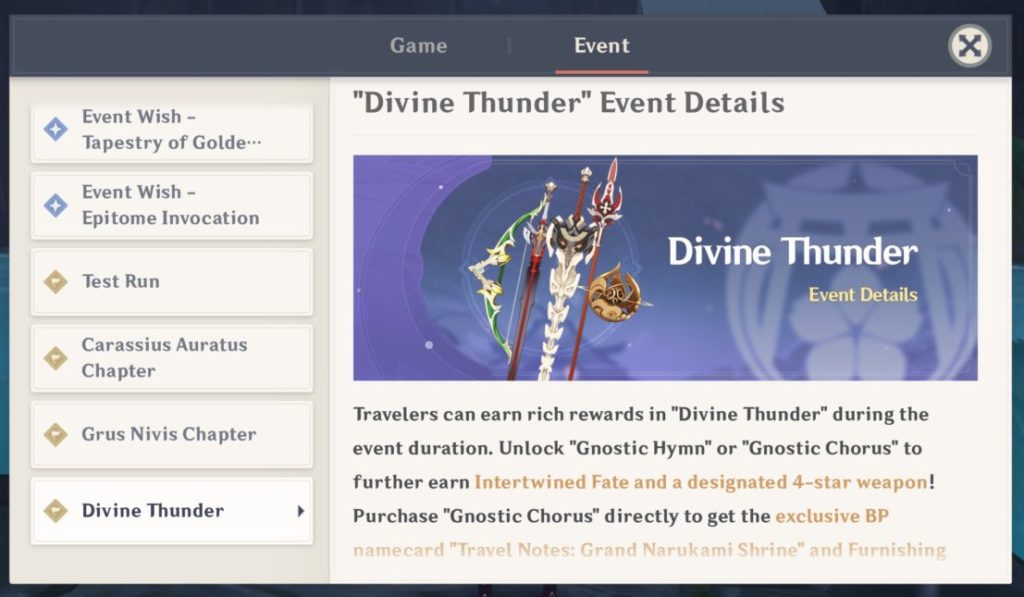
Right from the beginning of the game, inform your players about your in-game inbox or feed. Use this inbox to send them relevant communication like tutorials or rewards. By repeatedly driving them to the inbox, your players easily cultivate the habit of checking their inbox regularly.
Make sure you send your players a message to their in-game inbox a few days before sale seasons like the 4th of July.
While in-app messages are a great way to communicate with your active player base, you can also leverage online forums to create some pre-season buzz. If you have an active community, your moderators can pin the announcement on message boards. If you have an official website, you can put up an article on your blog announcing the sale season. A classic example is Activision’s Call Of Duty: Mobile’s blog.
👉 Here are 10 ways to boost in-app purchases.
2. Personalize your offers by creating advanced segments
Kabaam has built an interesting personalization strategy for their game, Marvel’s Contest of Champions. The players of this game are divided into three tiers – Uncollected, Cavalier, and Thronebreaker based on the percentage of the game content they’ve cleared.
This helps Kabaam curate the bundles of health potions, energy refills, and other related rewards like crystal shards. Since these tiers have different requirements, Kabaam is able to distribute offers more evenly.
Here’s a quick checklist of the different factors you can consider while segmenting your players:
| Player progression | Create internal tiers/brackets and bucket your players based on how much content they’ve finished. This will let you personalize the offers and increase conversion rates. |
| In-game activity | If a player has attempted the same level more than two times, show them an option to purchase a “buff” and clear the level. |
| Previous purchases | By observing what kind of resources players have purchased in the past, offer them bundles that have more of the same resources during the sale season. The chances of them purchasing these bundles will be higher.
This is typically helpful when you have multiple progression avenues such as character skills or weapon builds. Segmenting players based on past purchases will tell you their progression priorities, allowing you to offer them relevant bundles. Players who’ve also frequently completed transactions on your game are more likely to purchase the 4th of July or Black Friday/Cyber Monday deals. |
| Frequency of use | As a mobile game publisher, you have an array of digital communication channels available at your disposal.
The most active players can get lesser external communication from you than the lesser active players. Instead of sending push notifications or emails, focus on in-app communication to showcase your offers and announce upcoming sales events. Players with a lesser frequency of use can receive push notifications or emails. |
| Age group (if available) | If you’re collecting the age of your players, segmenting them based on this might help you send slightly higher-priced offers to certain age groups who’re less likely to be students or in the early stages of their careers. |
3. Boost rewards that enable player progression
Niantic, the mobile publisher behind Pokémon GO, launched “Season of Discovery” in June. During this season, players would encounter new Pokémon from eggs and different biomes. Since XP directly impacts player progression in the game, Niantic decided to increase the XP rewards to encourage participation.
By giving rewards that boost player progressions, you can expect more players to purchase your deals. However, it is important to control the rewards you’re offering. It is easy to alienate your free-to-play (F2P) players if the rewards are game-breaking. Secondly, if you end up giving too many XP boosts, then your players may not purchase offers during the next sales period.
4. Launch new events to engage your player base and encourage participation
By bundling new events and challenges during sale seasons, your existing players tend to open the game more frequently. This gives you more opportunities to highlight the rewards and benefits of the offers during the sale season. Restating the benefits of the ongoing offers repeatedly increases the chances of more players buying them.
Here’s what the following mobile publishers did during the 4th of July sale:
- Supercell introduced The Clash Worlds Qualifier Challenge and the One-Gem Collector Boost Event in July with new challenges and increased rewards and loot for the participating players.
- Mihiyo launched a new update to Genshin Impact which included over 20 hours of new content, two multiplayer events, and a new progression ladder for players.
- Niantic celebrated Pokémon GO’s fifth anniversary during the week of the 4th of July. Players could purchase exclusive bundles using in-game currency, which can be purchased using real-life currency from inside the app.
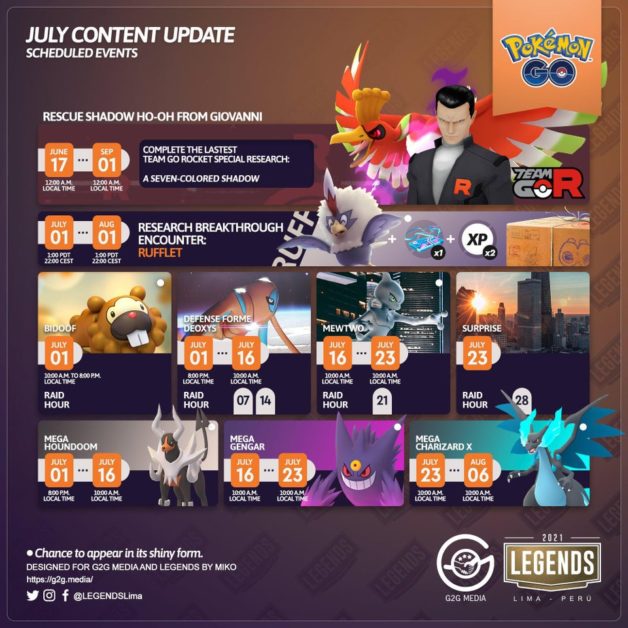
Conclusion
4th of July and Black Friday/Cyber Monday in November are two times in a year when mobile gamers expect to receive lucrative offers from you. By sending them personalized offers that enable player progression in the game will result in higher in-app purchases and conversions. You can also boost revenue by launching events during these times.
Owing to the COVID-19 pandemic the user attitude, confidence, and buyer behavior have taken a hit. You can read all about the common sale seasons throughout the year and a list of dos and don’ts in our Holiday Marketing Guide below:

